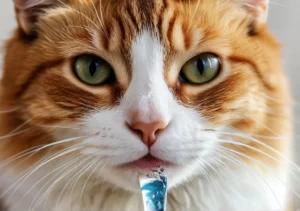Is your cat coughing and unable to meow? It can be distressing to see your feline friend in discomfort, especially when they are unable to vocalize their usual meows. But fear not, as we are here to provide you with some insights into why your cat may be experiencing these symptoms.
Cats may cough and be unable to meow due to a variety of reasons, including respiratory infections, allergies, asthma, or even a foreign object stuck in their throat. It’s important to pay attention to any other accompanying symptoms and consult with your veterinarian for proper diagnosis and treatment. Now, let’s delve into some possible causes and solutions for your cat’s coughing and inability to meow.
Common Causes of Coughing in Cats
Is your feline friend coughing and struggling to meow? Let’s unravel this mystery together. Hairballs are a common culprit when it comes to coughing in cats. When your cat grooms itself, it can ingest loose fur, leading to hairballs that irritate the throat and cause coughing. Allergies can also trigger coughing fits in cats, just like they do in humans. Keep an eye out for common allergens such as pollen, dust, or certain foods. Asthma is another possible cause of coughing in cats, leading to inflammation and difficulty breathing. If your cat is coughing persistently and struggling to meow, it’s crucial to consult your vet for a proper diagnosis and treatment plan.
Respiratory Infections in Cats
When your cat can’t meow due to coughing, a respiratory infection could be to blame. Respiratory infections, such as feline viral rhinotracheitis or feline calicivirus, can affect your cat’s ability to vocalize by causing inflammation and congestion in the respiratory tract. To help your furry friend recover, it’s essential to provide a warm and quiet environment for rest. Ensure they have access to fresh water and nutritious food to support their immune system. Consult your veterinarian for the best course of action, whether it’s antibiotics or supportive care.
Extra Tip: To ease your cat’s respiratory symptoms, you can create a steam room by running a hot shower and letting your cat spend a few minutes in the steamy bathroom. The moist air can help clear their airways and provide relief from coughing.
Allergies and Asthma in Cats
If you’ve noticed your cat coughing and struggling to meow, it could be due to allergies or asthma. Allergies in cats can be triggered by various things like pollen, dust, or certain foods, leading to coughing fits. Asthma is a chronic respiratory condition that can cause coughing and difficulty in breathing. To manage these conditions, it’s crucial to consult your vet for proper diagnosis and treatment. They may recommend allergy testing or prescribe medication to help alleviate symptoms. Additionally, minimizing exposure to allergens like keeping your home dust-free or using an air purifier can help your cat breathe easier.
Foreign Objects and Irritants
If your cat is coughing and suddenly can’t meow, they may have ingested a foreign object or encountered an irritant. Cats are curious creatures and can easily swallow small items that can get stuck in their throat, causing coughing. Common irritants like smoke or strong odors can also lead to throat irritation, affecting their ability to meow. To prevent such incidents, ensure your home is free of small objects that your cat could ingest. Keep potentially harmful substances out of reach, and create a safe environment for your feline friend to roam freely. If you suspect your cat has swallowed something harmful, seek immediate veterinary attention.
Additional Unique Insight: Hairballs are another common cause of coughing and hoarseness in cats. When your cat grooms itself, it ingests loose fur that can accumulate in their digestive tract, leading to hairballs. These hairballs can cause coughing fits and temporary loss of meowing ability. Providing your cat with hairball remedies or special diets designed to reduce hairball formation can help alleviate this issue. Regular grooming to remove loose fur can also prevent hairballs from forming in the first place.
Treatment Options for Coughing Cats
If your cat is coughing and can’t meow, there are several treatment options to consider. First and foremost, it’s essential to take your furry friend to the vet for a thorough examination. The vet will be able to determine the underlying cause of the coughing and voice loss.
One common treatment option for coughing cats is medication. Your vet may prescribe antibiotics if your cat has a respiratory infection or other medications to help reduce inflammation in the airways. It’s essential to follow your vet’s instructions carefully when administering any medication to your cat.
In addition to medication, environmental changes can also help alleviate your cat’s symptoms. Ensure your home is free of irritants like cigarette smoke, dust, and strong odors that can exacerbate coughing. Using an air purifier can also help improve air quality for your cat.
Lifestyle adjustments can also make a difference in your cat’s coughing and voice issues. Make sure your cat is well-hydrated and provide plenty of fresh water. Consider feeding your cat moist food to help soothe their throat.
If your cat’s coughing and voice loss persist despite these treatment options, it’s crucial to follow up with your vet for further evaluation and recommendations.
When to Seek Veterinary Care
If your cat is coughing and experiencing voice loss, it’s essential to know when to seek veterinary care. Some signs that indicate it’s time to take your cat to the vet include:
- Persistent coughing that lasts for more than a few days
- Difficulty breathing or rapid breathing
- Loss of appetite or weight loss
- Lethargy and lack of energy
- Wheezing or other abnormal respiratory sounds
If your cat is exhibiting any of these symptoms, it’s crucial to schedule a vet visit promptly. A thorough examination by a professional can help diagnose the underlying cause of your cat’s coughing and voice issues and determine the best course of action for treatment.
Remember, your cat’s health and well-being are a top priority, so don’t hesitate to seek veterinary care if you have concerns about their coughing and meowing issues.
Home Remedies and Care Tips
If your cat is coughing and can’t meow, it could be due to various reasons such as respiratory infections, allergies, or even hairballs. To help alleviate your pet’s discomfort, consider these home remedies and care tips: – Offer Steam Therapy: Create a steam room by running a hot shower and allowing your cat to breathe in the moist air to help clear their airways. – Hydration is Key: Ensure your cat is drinking plenty of water to keep their throat moist and facilitate easier coughing. – Gentle Grooming: Brush your cat regularly to prevent excess hair ingestion that can lead to hairballs and throat irritation. – Quiet Environment: Provide a calm and quiet space for your cat to rest and recover without straining their vocal cords further. – Consult Your Vet: If symptoms persist or worsen, consult your veterinarian for a proper diagnosis and treatment plan tailored to your cat’s needs.
For additional insights and guidance on your cat’s health, consider visiting the American Association of Feline Practitioners website for more information: AAFP Cat Health site.
Fun Fact About Cat Communication
Did you know that cats have over 100 different vocalizations to communicate with their owners and other cats? From meowing to growling to purring, each sound carries a unique message. So, if your cat is having trouble meowing, it’s essential to pay attention to other cues they may be using to express themselves. Cats are truly fascinating creatures with a complex language all their own!
Alex, a passionate animal lover, has experience in training and understanding animal behavior. As a proud pet parent to two dogs and three cats, he founded AnimalReport.net to share insights from animal experts and expand his knowledge of the animal kingdom.




